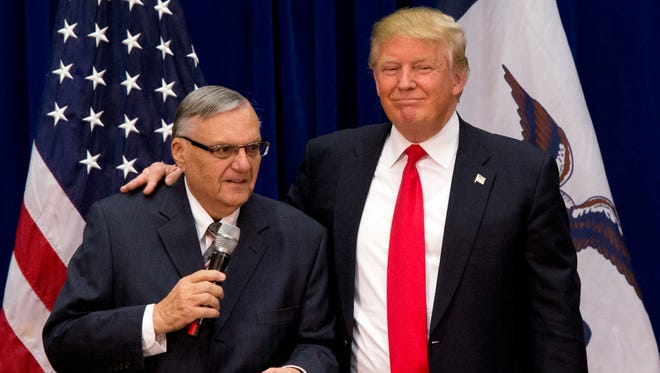No need for paperwork: Trump could pardon Sheriff Joe Arpaio in a tweet
 Gregory Korte
Gregory Korte
WASHINGTON — President Trump has twice suggested that he may pardon former Arizona sheriff Joe Arpaio — and White House lawyers are reportedly busy drawing up the paperwork to do just that.
But the president's power to pardon is so absolute that there's actually very little required in terms of paperwork. In fact, the president could grant a pardon in a tweet.
"Neither the constitution nor any statute prescribes the method by which Executive clemency shall be exercised or evidenced," reads a memo from the Justice Department. "It is wholly a matter for the President to decide, as a practical matter of administrative policy."
That memo, obtained by USA TODAY earlier this year under the Freedom of Information Act, was written in 1929 under the Herbert Hoover administration. But the memo still has currency, as presidents George W. Bush and Barack Obama have relied on it as precedent for both presidents to sign bills remotely using a device known as an autopen.
Arpaio was convicted of contempt of a court last month for disregarding a federal judge's order to stop detaining people suspected of being in the country illegally but not accused of a state crime. He's scheduled to be sentenced Oct. 5.
A pardon for Arpaio would delight Trump's anti-immigrant supporters, who see him as victim of an overzealous prosecution for failing to adhere to an ambiguous court order.
But civil rights groups like the ACLU said a pardon would be "an official presidential endorsement of racism" at a time when Trump is still facing a backlash from comments excusing the behavior of neo-Confederate protesters who marched alongside neo-Naxis and white supremacists this month in Charlottesville, Va.
The Justice Department confirmed that Arpaio has not formally applied for a pardon to the Office of the Pardon Attorney, which is the usual process for seeking a pardon. Under Justice Department regulations, a pardon-seeker must have been convicted at least five years ago, making Arpaio ineligible through the regular channels. And Arpaio told the Arizona Republic this month that he wouldn't even ask Trump for a pardon.
But that hasn't stopped Trump from dangling the possibility — first in an interview with Fox News, and again at a Phoenix rally Tuesday.
"He should have had a jury, but you know what? I'll make a prediction. I think he's going to be just fine, OK?" Trump said, hinting at a pardon. "But I won't do it tonight, because I don't want to cause any controversy. Is that OK? All right?"
The Justice Department regulations are only advisory, since the Constitution itself gives the president the "power to grant Reprieves and Pardons for Offences against the United States, except in Cases of Impeachment."
That same clause, legal scholars say, means that neither Congress nor the courts can put any limits on how the president exercises that authority. In fact, Trump technically doesn't even have to sign anything: "To burden the President with the labor of signing the warrants is, as a matter of law, wholly unnecessary," the 1929 memorandum said.
Other than the Arpaio pardon — and a comment via Twitter that "all agree the U.S. President has the complete power to pardon" — Trump has shown little interest in the pardon power in his first seven months in office. He has yet to appoint a new pardon attorney, and has not outlined his pardon policy for the Justice Department.
According to the Office of Pardon Attorney, 376 people have applied for pardons since Trump took office. The president has taken no action on any of them.